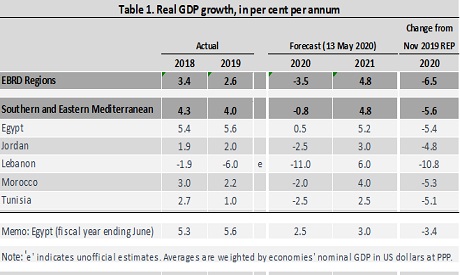Egypt’s GDP is expected to grow by 2.5 percent in the current FY2019/2020 and by 3 percent in FY2020/2021, on the back of the weak outlook in the tourism sector, disruptions in global value chains, weaker demand from trading partners, and the slowdown in foreign direct investment (FDI), according to the European Bank for Reconstruction and Development (EBRD).
In its regional economic outlook report released on Wednesday, the EBRD said that large public construction projects and the boom in the telecommunications sector have so far sustained Egypt’s growth.
On the calendar year basis, according to the report, Egypt’s economic growth will drop by 0.5 percent in 2020, before rebounding to 5.2 percent in 2021.
The main risks to Egypt’s outlook arise from the need for a tougher lockdown should the spread of COVID-19 accelerate and from the negative outlook in Egypt’s main trading partners, according the report, noting that measures to contain the spread of the coronavirus will lead to a slowing of growth in the fourth quarter of current FY2019/2020, which ends in June, and the first half of the next fiscal year.
Growth in Egypt has continued to accelerate in the first half of FY2019/2020, matching the rate achieved in FY2018-19, of 5.6 percent, driven by retail, industry and agriculture, in addition to oil refining, communications, construction and tourism, according to the report.
In the southern and eastern Mediterranean region, where Egypt is located, the EBRD said that the negative impact of the coronavirus is expected to be seen in tourism, a major driver of growth in all of the region’s economies in 2019, a decline in domestic demand due to containment measures, a fall in demand from the main trading partners and slowdown in foreign direct investment inflows.
On average, the economies of the region are expected to shrink by 0.8 percent in 2020 before rebounding with growth of 4.8 percent in 2021, according to the report.
Other economies in the region, including Jordan, Morocco, Lebanon and Tunisia, are all expected to contract in 2020, with an especially sharp drop of 11 percent foreseen in Lebanon, which had already fallen into recession in 2018 and 2019, the report projected.
Economies across the regions of the EBRD are likely to contract on average by 3.5 percent in 2020, because of the impact of COVID-19, with a rebound of 4.8 percent possible in 2021; yet these projections are subject to unprecedented uncertainty, according to the report.
Ahram Online
13/05/2020























































